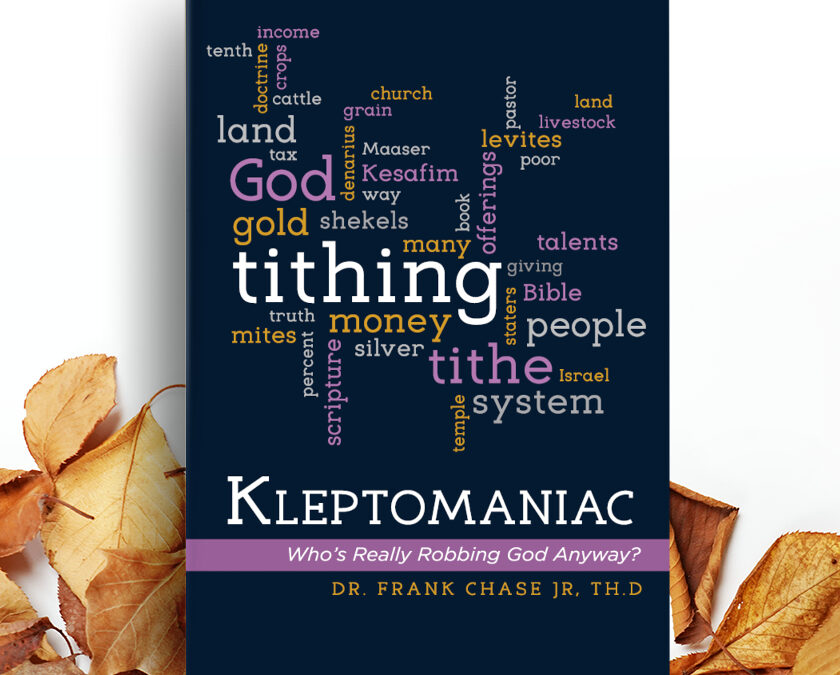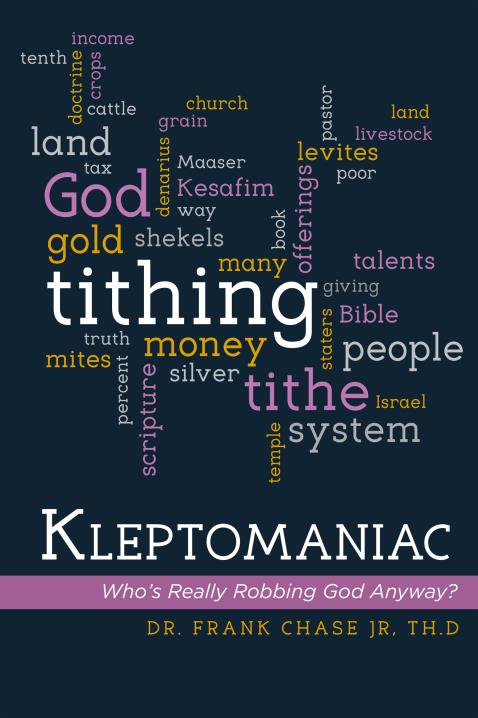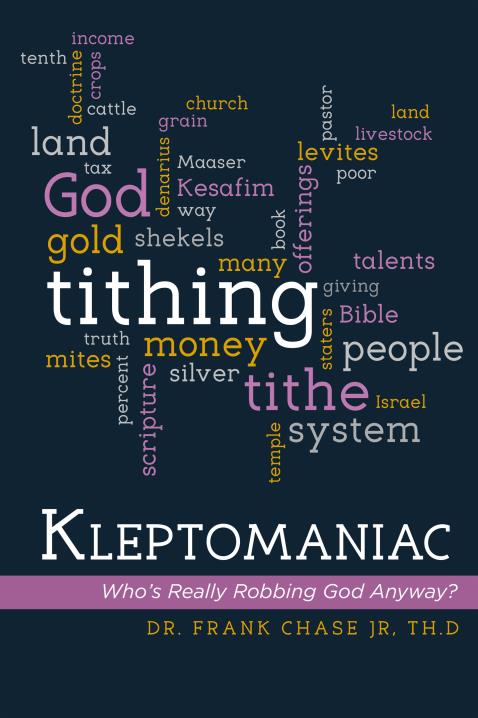Robbing God of tithes and offerings is the call from the pulpit every time people enter church. But in this short study, I examine what God thought he was being robbed of in the book Malachi. I could not cover everything, but I wanted to give a synopsis of what’s really going on in Malachi. So the question, who is really robbing God and what is he being robbed of?
Malachi 3:10 From Different Bible Versions
10 Bring ye all the tithes into the storehouse, that there may be meat in mine house, and prove me now herewith, saith the LORD of hosts, if I will not open you the windows of heaven, and pour you out a blessing, that there shall not be room enough to receive it. KJV
10 Bring the whole tithe into the storehouse, that there may be food in my house. Test me in this,” says the LORD Almighty, “and see if I will not throw open the floodgates of heaven and pour out so much blessing that there will not be room enough to store it. NIV
10 Bring the whole tithe into the storehouse, so that there will be food in my house, and put me to the test says, ADONAI-TZVA’ ot. See if I won’t open the floodgates of heaven and pour your out a blessing far beyond your needs. Complete Jewish Bible (CJB)
10 Bring the full tithe into the storehouse, that there may be food in my house. And thereby put me to the test, says the LORD of hosts, if I will not open the windows of heaven for you and pour down for you a blessing until there is no more need. ESV

Looking at the KJV, NIV, and CJB there is something strange that can throw off readers when trying to figure out tithing. What does it mean to: Bring ye all the tithes, Bring the whole tithe: Bring the whole tithe and Bring the full tithe from four different versions of the Bible?

In the KJV, tithes indicates that it is a plural word. The word tithe without the letter ‘s’ is singular. Tithes in Malachi indicates or refers to more than one thing. Do the phrases, whole tithe, full tithe and tithes carry a different thought pattern as you read each from the different Bible versions listed? Words have a powerful impact on the self-conscience and influences our understanding even when you are not cognizant of that fact. When translators and scholars start messing around with words in a Bible verse, no matter how careful they are, it can change the meaning of the word and the original intent of the author of the book in unintentional ways, which leads to scriptural error.
As a person who studies this subject, I did not list the Contemporary English Version (CEV) for Malachi 3:10 because the wording used in that verse leads unsuspecting readers to conjure up money as the subject of text in reference to tithe in the CEV version. Useing the phrase, “Bring the entire ten percent” is problematic because it sets up preconceived interpretation of the word tithe and associates it with money. So why does this happen in different versions of the Bible? To maintain a doctrine, most Bible publishing companies have a vested interest in maintaining a monetary tithe system, so they will insert words in transliterations that support a particular doctrinal position outside of the original intent of the author. But how does an unsuspecting church pew sitter or member figure this out? Most do not and have not idea that they are being scripturally bamboozled.
The King James Version of the Bible is over 300 years old. The first place to start trying to figure out what Malachi is referring in reference to tithes and offerings is to begin with the official identification of what God Commanded as a tithe in the scripture and its meaning.
God did not identify what the content of tithes were in Malachi 3:10, so you have to go back to where the critical introduction of tithes first appeared. God identified what tithes were and what he commanded as vows and tithes in Leviticus. God said in Leviticus 27:30-32: 30, “Every tithe of the land, whether of the seed of the land or of the fruit of the trees, is the LORD’s; it is holy to the LORD. 31 If a man wishes to redeem some of his tithe, he shall add a fifth to it. 32 And every tithe of herds and flocks, every tenth animal of all that pass under the herdsman’s staff, shall be holy to the LORD.” (ESV)

From Leviticus, God identified the tithe coming from the land. Tithes came from what was planted as seed of the land or fruit from the trees. And then he identified that every tenth animal from the livestock was tithed. So if you look at KJV’s word tithes in Malachi, it makes sense that tithes is plural because we are talking about crops, fruit from trees and livestock. God said in Leviticus 27:34 that he commanded the tithes of crops, fruit, and livestock to be given by the people of Israel.
The way you pin down so-called monetary tithers is to go further and define the word tithe in its original Hebrew language. The Hebrew language is important because you can empirically define tithe, which means the substitute definition of a monetary tithe is rendered erroneous and won’t bamboozle you. The word tithe in Hebrew is Ma’aser. It means tenth part, not ten percent. So that means every tenth animal was tithed and no one really knows how Israel measured out a tenth part of the crops, so the harvest tithe was not an exact science. Not one time did God suggest money in Leviticus or Malachi and for anyone to suggest that tithes are money commits eisegetical treason against the scripture and God by interpreting scriptural text in a way that introduces their own presuppositions, agendas and biases, which is nothing more than reading into the text what is not there, when God made it clear what products he commanded Israel to tithe.
“The authentic sanctioned biblical tithe is food. Any extra-biblical definition that inserts money as a tithe is out of context. That means it is unbiblical to include non-food items. Israel’s tithe existed in a pre-monetary agricultural theocracy and is inextricably tied to land not money. Since “maaser” refers to everything eatable, then all tithes should derive from harvests and livestock to support the sacrificial system managed by high priests and Levites. From Genesis to Revelation, the Bible never mentions tithing on denarius, bekahs, drachmas, gerahs, talents, mites, shekels, or silver. No reasonable person could study tithe verses in the Bible and then on purpose ignore that the tithe was strictly land-based and never income based. Since the correct biblical definition of the tithe is agrarian, no one should ever associate the word tithe with money.” Excerpt From: Dr. Frank Chase, Jr., Th.D. “Kleptomaniac: Who’s Really Robbing God Anyway?” iBooks.
Israel tithed produce of the field annually, and every tenth animal from the herds and flocks as new animals were born. The thing about the livestock was that each Israelite rancher had to have a birth cycle of at least ten or more calves and every tenth calf was given to God as a tithe. So if a cattle herder had 30 calves born in a cycle, three calves were tithed. By the same token, if he had 9 calves birthed in a cycle, there was no tithe required because God commanded the tenth animal that passed under the herdsman’s rod to be tithed, not the 9th animal. Another small nuance is that every three years the agricultural tithe was designed particularly for the Levites, the sojourner, the fatherless and the widow. The yearly tithed was shared also with these groups of people and the Levites were never left out of receiving part of the tithe.
Now let’s look at the phrases the whole tithe and the full tithe. Unlike the King James Version, tithe is singular in the NIV, CJB and ESV versions, but are the words full and whole used to indicate a plural understanding that more than on thing should be understood and not a single tithe from one item. Full and whole tithe to me means you bring everything and that is crops, cattle, herds and flock, like Leviticus indicates. The NIV, CJB and ESV’s use of full and whole tithe could mean that the tithe they brought was somehow not the best and it should have been the best. Whole and full could go back to what were they offering. In Malachi chapter 1: 7-8 here is what God said, “7 Ye offer polluted bread upon mine altar; and ye say, Wherein have we polluted thee? In that ye say, The table of the LORD is contemptible. 8 And if ye offer the blind for sacrifice, is it not evil? and if ye offer the lame and sick, is it not evil? offer it now unto thy governor; will he be pleased with thee, or accept thy person? saith the LORD of hosts.
All the tithes, the whole tithe, and the full nothing more than God telling the priests in Malachi that that they offered blind, lame and sick livestock as tithes and offerings and kept the good stuff for themselves. So the definition of bringing the whole and full tithe that uses that word, means bringing to the storehouse animals, food and other goods without blemish like Malachi chapter 1 indicated, but they had to bring the best of the animals, crops and foodstuffs. And not one time did God command money. All things that are subject to tithing have always been and always shall be connected to the land, which were eatable items. Tithes were always the increase from the land, which are eatable products. There is no scripture that tells the Israelites to tithe from an increase in general such as money. The mere fact that the Bible describes Abram paying a tithe does not mean that pastors should equate that description–a one time event–as a license for prescription. What pastors are doing is writing a new scriptural prescription as a license to turn the original tithe into a new form of unauthorized mandatory fundraising doctrines outside of the context of God’s original intent for the tithe.
“The law specified certain products connected to the land that were liable to the tithe laws of the Old Testament. That is a scriptural fact. In the Jewish Mishnah it states, “whatsoever is used for food and is kept watch over and grows from the soil is liable to Tithes (plural). In general, the qualifications for products liable to tithes were that they must be; 1.“eatable, 2. the property of an individual, and 3. the product of the soil. It is clear that the connection of products liable to tithes to the land was very strong; and it was originally, only products produced from Palestine were included. Now in the New Testament times, artisans, fishermen, and tradesmen did not pay tithes on their income, and Jews outside of Palestine (those in the diaspora) did not pay tithes on anything.”
YOU MEAN I DON’T HAVE TO TITHE
BY DAVID CROTEAU, 2010
ROBBING GOD OF TITHES AND OFFERINGS

A lot of people really think Malachi 3:8-10 is God’s command to tithe money from paychecks. But let’s look at examples of what God was being robbed of. In order to get an understanding of Malachi, every person must read the entire book of Nehemiah to get a clear picture of the kinds of tithes and offerings that were being stolen from God. So Nehemiah chapter 13:10-12, sets things straight about the tithe.
10 I also found out that the temple singers and several other Levites had returned to work on their farms, because they had not been given their share of the harvest. 11 I called the leaders together and angrily asked them, “Why is the temple neglected?” Then I told them to start doing their jobs. 12 After this, everyone in Judah brought a tenth of their grain, wine, and olive oil to the temple storeroom. (CEV)
10 I also learned that the portions assigned to the Levites had not been given to them, and that all the Levites and musicians responsible for the service had gone back to their own fields. 11 So I rebuked the officials and asked them, “Why is the house of God neglected?” Then I called them together and stationed them at their posts. 12 All Judah brought the tithes of grain, new wine and olive oil into the storerooms. (NIV)
The portions/harvest that was not assigned/given to the Levites was the tithe. It was clear the Levites could not work their term in the temple because the storehouse rooms were empty of tithes and offerings. And Nehemiah made sure all the tithes of grain, new wine and olive oil was there for the Levites to eat and do their temple responsibilities. So by the time you get to Malachi, you can see the tithing was still a problem and this time Nehemiah did not speak about the tithe but God did. If you need more proof that Malachi is talking about eatable items; then you have to go to 2 Chronicles 31:6 which reads:
6 And concerning the children of Israel and Judah, that dwelt in the cities of Judah, they also brought in the tithe of oxen and sheep, and the tithe of holy things which were consecrated unto the LORD their God, and laid them by heaps.
ROBBING GOD OF OFFERINGS

Malachi 3:8 Will a man rob God? Yet ye have robbed me. But ye say, Wherein have we robbed thee? In tithes and offerings.
Now that we’ve talked about tithes, let’s talk about offerings and what did God view as offerings. Most people think offerings were money only, but this is not true. So what offerings was God being robbed of? The Hebrew word is Strong’s #8641, Truwmah. Most of the offerings that God is speaking about in Malachi is found in Exodus, Leviticus, Numbers and a few in Deut. Many of the offering required consisted of produce of the ground. Some scriptures reference silver or gold but is was associated with a tax. I can’t list all the offerings required because there over 1000 offering verses, but I’ll list some to give you an idea. A lot of items were designated a Truwmah (offerings) in the scripture. The first time God requests Truwmah (offerings) is in Exodus 25:2, 2 Speak unto the children of Israel, that they bring me an offering: of every man that giveth it willingly with his heart ye shall take my offering.
Although I spoke about this verse in my book, Kleptomaniac: Who’s Really Robbing God Anyway, being the first time God instituted freewill giving and that it had to come from a willing heart, I will not belabor this point. Whereas Exodus speaks of a willing offering from the heart, the offerings written about in Mal. 3:8 is not willing or freewill. These offerings are required by law and do not depend on whether your heart desires to give it or not. You must pay these offerings. I will lay out some of those offerings from the books of the law mentioned above.
Get Kleptomaniac: Who’s Really Robbing God Anyway? on your iPad: Kleptomaniac – Frank Chase Jr
OFFERINGS BEFORE THE LAW
What was Cain’s and abel’s offering? (Gen 4:3-4)
3 And in process of time it came to pass, that Cain brought of the fruit of the ground an offering unto the LORD. 4 And Abel, he also brought of the firstlings of his flock and of the fat thereof. And the LORD had respect unto Abel and to his offering:… (the offerings here are crops and flocks).
What did Abraham offer instead of his son? (Gen 22:13)
13 And Abraham lifted up his eyes, and looked, and behold behind him a ram caught in a thicket by his horns: and Abraham went and took the ram, and offered him up for a burnt offering in the stead of his son.
What kinds of offerings did God ask for? (Exodus 25:21-1-8)
2 Speak unto the children of Israel, that they bring me an offering: of every man that giveth it willingly with his heart ye shall take my offering. 3 And this is the offering which ye shall take of them; gold, and silver, and brass, 4 And blue, and purple, and scarlet, and fine linen, and goats’ hair, 5 And rams’ skins dyed red, and badgers’ skins, and shittim wood, 6 Oil for the light, spices for anointing oil, and for sweet incense, 7 Onyx stones, and stones to be set in the ephod, and in the breastplate. 8 And let them make me a sanctuary; that I may dwell among them. This offering was voluntary contributions specifically for building the mobile sanctuary. So as you can see the first temple/statuary was built by offerings from gold, linen to wood. This is also the pattern that should be in place when a pastors want to build a house for people to call church. Not one time did God request a tithe to support the church.
What other offerings did God request from his people?
1. Sin Offering. 14 But the flesh of the bullock, and his skin, and his dung, shalt thou burn with fire without the camp: it is a sin offering. (Exodus 29:14)
2. Burnt offering. 18 And thou shalt burn the whole ram upon the altar: it is a burnt offering unto the LORD: it is a sweet savor, an offering made by fire unto the LORD. (Exodus 29:18)
3. Wave and Heave offering. 27 And thou shalt sanctify the breast of the wave offering, and the shoulder of the heave offering, which is waved, and which is heaved up, of the ram of the consecration, even of that which is for Aaron, and of that which is for his sons: (Exodus 29:27).
4. Drink Offering. 40 And with the one lamb a tenth deal of flour mingled with the fourth part of an hin of beaten oil; and the fourth part of an hin of wine for a drink offering. (Exodus 29:40)
5. Shekel Offering. 13 This they shall give, every one that passeth among them that are numbered, half a shekel after the shekel of the sanctuary: (a shekel is twenty gerahs:) an half shekel shall be the offering of the LORD. (Exodus 30:13) Shekels were not coins, as we understand it but weights. Coins as money were not invented until the seventh century.
6. Temple Offerings: See Exodus 35. The offerings here reference back to the temple building and its care and maintenance.
OFFERINGS IN THE BOOKS OF THE LAW
1. Herd and flock offering. 2 Speak unto the children of Israel, and say unto them, If any man of you bring an offering unto the LORD, ye shall bring your offering of the cattle, even of the herd, and of the flock. (Leviticus 1:2)
2. Turtledove pigeons and fowls as offerings. 14 And if the burnt sacrifice for his offering to the LORD be of fowls, then he shall bring his offering of turtledoves, or of young pigeons. (Leviticus 1:14)
3. Sin, burnt, and Drink Offering. 25 And one kid of the goats for a sin offering; beside the continual burnt offering, his meat offering, and his drink offering. (Numbers 29:25)
4. Different offerings made. 70 One kid of the goats for a sin offering:
71 And for a sacrifice of peace offerings, two oxen, five rams, five he goats, five lambs of the first year: this was the offering of Ahiezer the son of Ammishaddai. (Numbers 7:70)
5. Offerings made. 6 And thither ye shall bring your burnt offerings, and your sacrifices, and your tithes, and heave offerings of your hand, and your vows, and your freewill offerings, and the firstlings of your herds and of your flocks: (Duet 12:6)
6. What do you do with offerings? 1 The priests the Levites, and all the tribe of Levi, shall have no part nor inheritance with Israel: they shall eat the offerings of the LORD made by fire, and his inheritance. (Duet. 18:1)

There is a short list of what offerings God requested from Israel. If you read Leviticus chapters 1-7:38 and the other books of the law you’ll find these offerings that were related to the sacrificial system in general and are connected to food and drink.
A. Burnt offerings (making atonement for sin)
B. Grain offerings (showing honor to God, praise)
C. Sin offerings (payment for unintentional sins)
D. Fellowship offerings (showing gratitude to God, Praise)
E. Trespass offerings (payment for sin against others and God)
F. Meat Offerings (payment to priests)
E. Drink offerings (pour out on the alter for sin)
All of these offerings center on payment for something done wrong and for payment of committing sin. Now, if you notice in Deut. 12:6 God tells the Israelites to bring the priests and Levites the burnt offerings, sacrifices, tithes, heave offerings, vows and freewill offerings to include offerings of the herds and flocks. And in verse 7, God goes on to tell them [priests and Levites] what to with all of the offerings. In verse 7, God says, “7 And there ye shall eat before the LORD your God,…”. God also makes it clear again that tithes and offerings were to be eaten, like it says in Deut. 18:1 “1 The priests the Levites, and all the tribe of Levi, shall have no part nor inheritance with Israel: they shall eat the offerings of the LORD made by fire, and his inheritance.” The inheritance for the Levites and Priests was not the land; it was the tithes and offerings, which they were commanded to eat.
So in Malachi when God said how they robbed him of offerings, He was speaking of lambs, rams, oxen, goats, wine, flocks of birds, turtledoves, and pigeons, which are all eatable items. In Malachi 3:8-10, is not talking about monetary tithes or offerings. Therefore Malachi 3:8-10 does not apply to your paycheck and therefore it is never required in the New Testament because the text tithes and offerings only refer to eatable items. Make no mistake, tithing only applied to agricultural produce and every tenth animal. Tithing never applied to paychecks or wages, and there are no biblical scriptures to suggest that monetary tithing exists at all. And offerings were never strictly money in the book of Malachi.







Recent Comments